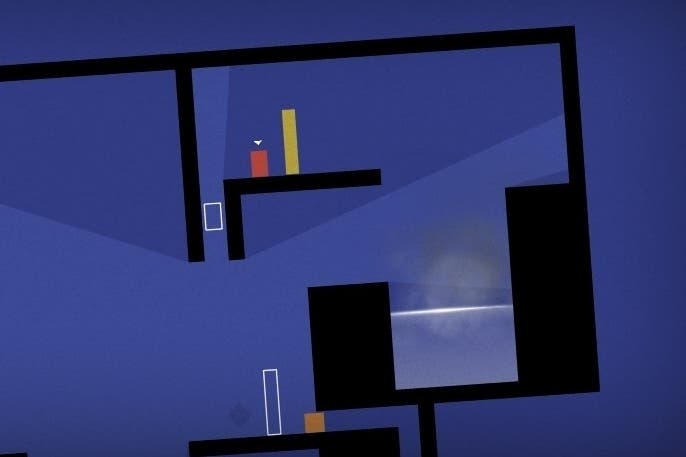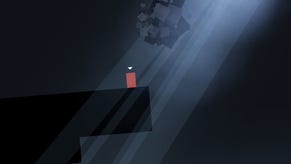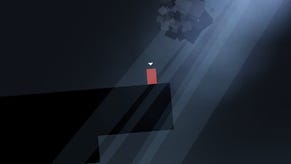Thomas Was Alone review
Write angles.
As games become ever more numerous, our old and trusted genre categories for them seem ever less useful - especially when they get in the way. Thomas Was Alone is a platformer built from the purest elements, but one that, in traditionally important aspects like challenge or length, wouldn't score highly. Does it matter?
The correct answer is no, but it's the game's keen sense of platform game craft and history that raises the question in the first place. The word 'deconstruction' has long been ruined by amateur chefs and critics, but in the true sense, it catches one of Thomas Was Alone's underlying themes. The game's opening takes the form of 10 short and simple platforming variations, a breeze for anyone, each environment's angles sculpted into a safe playground. As the game progresses you'll see more than one nod to the Mushroom Kingdom or The Lost Vikings - or you'll think you do, until a second glance shows just well-spaced squares.

After this beginning, Thomas Was Alone slowly begins introducing an extensive cast. It's a game with a story to tell, and a very good one at that. Each level begins with a few lines from the narrator, an omniscient presence voiced by Danny Wallace, and as you're guiding the team through, he often says other things. It turns out Wallace is playing several characters; he's a solo ensemble. The oddest aspect of the characters is that they're represented as rectangles and squares. There are no googly eyes or hats, just different shapes and colours, yet by the end of the game you'll think of each shape as its own person.
You get fond of them, with the arch and surreal script complemented perfectly by the childish malevolence in Wallace's voice. The shapes all have their own thoughts about the ongoing situation, and goals, and favourites among the other shapes. In what is probably Thomas Was Alone's greatest achievement, their characters bleed into how you're manoeuvring the little band around levels. For example, Chris, who turns up fairly early, is a squat orange brick that can't jump very high. He's a bit touchy and grumpy around more generously-gifted shapes, and sometimes it's a pain to get him around. But I love Chris's constant grouching - and so whenever he's atop one of those taller rectangles, it always seems a triumph of the spirit. Like Chris is clambering on their heads.
Imagining that rectangles have heads is absurd, obviously, but after a short time in this world, that's how you'll be thinking. The craft in the animations and sound effects imparts a little additional personality, quite apart from the rectangles' 'thoughts', with individual shapes having a different 'springiness' on the sides and a distinctive landing 'thoomp'. Beyond even this, the momentum and arc of the gorgeously tuned jumps captures each block's grace - or lack of it - perfectly. The way these details blend with the mechanics and narrative makes the interplay between the shapes feel like a buddy movie, even though, to a cold eye, it looks and plays like stacking.
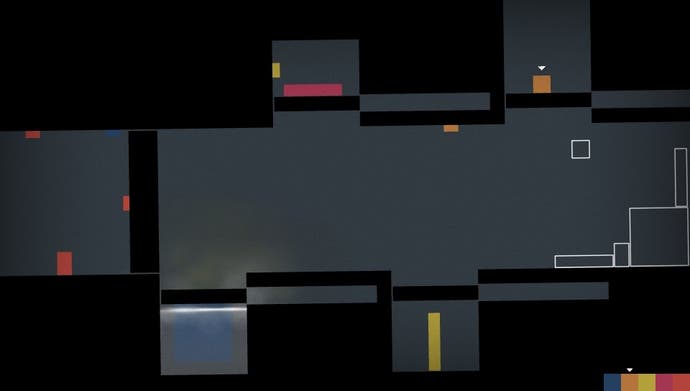
As for the stacking, solving puzzles bit by bit is the main meat of Thomas Was Alone. The various characters have to reach individual exits, and levels can have any number and combination of the characters you've met so far. There are, it turns out, an awful lot of ways shapes can be used together, and Thomas Was Alone's gentle learning curve keeps them ticking over with variation upon variation.
All of this build-up in complexity doesn't quite pay off, however. Thomas Was Alone may steadily increase what it demands of the player, but just as it threatens to become challenging, it eases off the throttle. The last third or quarter feels like a plateau, with the game perhaps overly focussed on delivering the narrative side of things, and you sail over the finish line very easily. It's disappointing, because there are glimpses of wickedness sprinkled throughout, yet you never quite feel like you've been thoroughly tested.
One way this can be mitigated is by plumping for the new downloadable content, a timed exclusive coinciding with this PlayStation release (Thomas Was Alone originally came out for PC and Mac last year). Perhaps Thomas Was Alone should have been released as one definitive version, but you can't argue with £6 for the main game and £2 for a new, 30-level expansion. This introduces Benjamin - a square that has a jetpack because of reasons - and acts as an antechamber to the main game's story. Here your capabilities are stretched a little further, with extended flying challenges and more deadly obstacles from the off - though the best moments still, of course, come when you start warming to the irrepressibly curious, cheery, and slightly vain Benjamin.
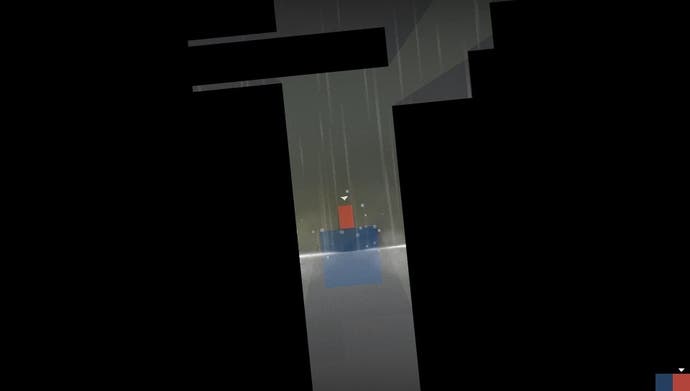
I'm talking about the personalities of featureless bricks again. It's remarkable how much Thomas Was Alone's story and abstract style blend together, and this is one of the reasons the questions surrounding its challenge and length are so fraught. The experience is designed to be smooth; it's paced like a radio play rather than a traditional platformer, with as few awkward silences as possible.
To put that another way, Thomas Was Alone takes the road less travelled. Here you play cogs in a machine rather than driving the action, an observer as much as a participant - finding and creating little story fragments from the barest movement. It's an original, and when something has personality, the flaws become quirks; even, in a way, essential. Thomas Was Alone, needless to say, has a whole lot of personality.
